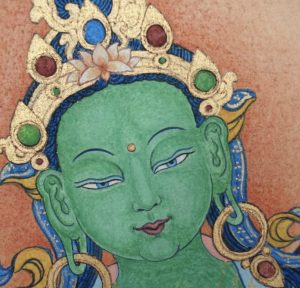
15 May marked this year’s Buddha Day in several parts of the world, such as Bangladesh, Vietnam, South Korea, China, and the HKSAR. In China, this holy day was commemorated by the Buddhist Association of China. The celebrations were held at the Association’s headquarters at Guangji Temple, Beijing.
Buddha Day, also known as Buddha’s Birthday, Buddha Jayanti, Buddha Purnima, and more marks the birth of Siddhartha Gautama, marking the formal, idealized beginning of the Buddha-era on Planet Earth. In South and Southeast Asia, Buddha Day is commemorated as part of Vesak, which covers the Buddha’s Nirvana under the Bodhi tree at Bodh Gaya and his passing in Kushinagar. But in China and much of East Asia, Buddha Day is celebrated separately from the enlightenment and Parinirvana of the Buddha.
On X, formerly known as Twitter, state-owned platform Global Times shared a photo gallery of the event, stating that the National Religious Affairs Administration had sent a congratulatory letter to the Buddhist community across the country on the 15th. “Representatives from the three major systems of Chinese Buddhism, Tibetan Buddhism, and Southern Buddhism, as well as diplomats from various countries, attended the event to celebrate Buddha’s birthday.” (X)

Amid the celebrations, ambassadors and envoys participated in a delightful bathing ceremony for an image of the infant Buddha in the Nahavira Hall of Guangji Temple. (China Daily) This popular practice (yu fo 浴佛) in East Asian Buddhism is drawn from apocryphal scriptural sources and celebrates the mythic showering of the newly born Siddhartha with fragrant water by nine dragons.
In its letter, the National Religious Affairs Administration emphasized that the Buddhist communities of China “should uphold and promote the fine tradition of patriotism, advance the Sinicization of Buddhism in China, and better integrate Buddhism with socialist society.” (China Daily)
Ven. Yanjue, president of the Association, told assembled delegates that in past centuries, generation after generation of disciples of Buddhism had communicated the spirit of the Buddha’s compassion and wisdom. Buddhists had played a role in “building bridges of friendship, mutual respect and common development among the peoples of different countries, thereby making contributions to world peace.” (China Daily)
Ven. Yanjue also said in his speech that in the face of global changes and challenges unseen in a century, “The Buddhist community nationwide should carry forward the fine traditions of Buddhism and unite and strive for the prosperity of the country, world peace and tranquility, and the relief of suffering for all beings.” (China Daily)

Earlier in March, at the Boao Forum for Asia Annual Conference, Ven. Yanjue praised the role of Chinese Buddhism in the broader history of the Dharma’s diffusion. He stated that Chinese Buddhists had embodied the original intention (yuan yi 原意) of the Buddha and “inherited the essence of Buddhism” through the “large-scale translation of scriptures, elucidation of Buddhist thought, establishment of sects, institutional innovation, and cultural integration.” (Hindustan Times) The influence of Buddhism as it developed in China also helped to shape the spiritual trajectories of other empires and countries in Asia, including Japan and South Korea. Apart from the spread of Buddhism, Chinese Buddhist monks and leaders “enhanced the compatibility of Buddhism with East Asian cultures, civilisations, societies, and people.” (Hindustan Times)
Founded on 30 May 1953, the Buddhist Association of China is the official supervisory organization of Buddhists in the People’s Republic of China. Since 2018, it has operated under the National Religious Affairs Administration, also known as the United Work Front. While it has been largely led by monastics over the years, its most famous and possibly most influential leader was the powerful Buddhist layman and calligrapher Zhao Puchu (1907–2000).
See more
Buddha’s birthday commemorated in Beijing (China Daily)
Buddha’s birthday celebrated in Beijing (Global Times)
China played ‘pivotal role’ in promotion of Buddhism globally: Top Chinese Buddhist monk (Hindustan Times)
Related news reports from BDG
Taiwanese Buddhist Association Donates Relics to China
Beijing-approved Panchen Lama Elected Head of Buddhist Association of China in Tibet
China Religious Culture Communication Association Announces Fifth World Buddhist Forum in China’s Fujian Province
Related features from BDG
Buddhistdoor View: Unfinished Dispensation – The Search for Buddhist Authenticity in China
Related blog posts from BDG Tea House
From the Capitals to the Corridor: A Visit to China’s Silk Road
State Sangha: Buddhism for the People














